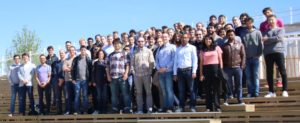Daresbury Laboratory, UK, 13-17 May 2019
Organisers:
Daresbury: Leon Petit, Jerome Jackson, Martin Lüders
King’s College London: Mark van Schilfgaarde, Dimitar Pashov
The third Questaal school concentrated on qsGW and DMFT using the code’s new interface to the TRIQS library. A series of tutorials enabled the 31 participants (mostly post-doctoral researchers and lecturers) to setup and run calculations starting from density functional theory and working up to GW, qsGW, LDA + Bethe Salpeter (BSE), or the inclusion of ladder diagrams in W: qsGW^BSE, and DMFT. The participants were encouraged to experiment with a diverse range of materials, including itinerant magnets, f-electron systems, simple semiconductors and strongly correlated insulators.
In addition to the new TRIQS DMFT capability, the school also showcased recent developments in extending the GW self-energy by including phonon contributions and the first results of the new “Jigsaw Puzzle Orbital” basis, which is a full-potential analogue of the LMTO screening transformation which is short ranged and compact while still very precise. Continue reading 3rd Daresbury QUESTAAL School


